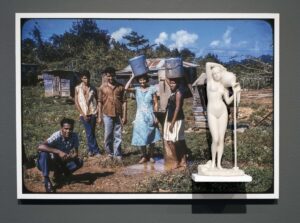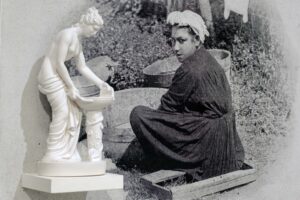‘cuestiones caribeñas/caribbean matters’ confronts colonialism and highlights shared experiences across the archipelago
MADISON, Wis. — Grapple with the Caribbean’s complex contradictions and engage its diverse cultural matrix in “cuestiones caribeñas/caribbean matters: assemblage and sculpture by pablo delano.” The exhibition, on view Aug. 11-Nov. 30 at the Chazen Museum of Art at the University of Wisconsin–Madison, considers contemporary Caribbean reality through the juxtaposition of appropriated photographic images, archival documents and found objects. With irony and wry humor, visual artist and photographer Pablo Delano (b. 1954 San Juan, Puerto Rico) subverts longstanding stereotypes and questions historical narratives while also affirming and celebrating the region’s global impact and resistance.
Colonialism and conquest shaped the Caribbean, creating ethnic diversity and social hierarchies. This historical impact is reflected in the archipelago’s distinct cultural and national identities but also in a common Caribbean ethos shared across the former and current Spanish, British, French, Dutch, Danish and U.S. territories. In his first solo exhibition since his participation in the 60th International Art Exhibition at the 2024 Venice Biennale, Delano ponders these Caribbean commonalities, critiquing past and current systems of oppression but also building solidarity rooted in shared histories.
Exhibition co-curators and UW–Madison faculty Jorell Meléndez-Badillo, assistant professor of history, and Aurora Santiago Ortiz, assistant professor of gender and women’s studies and Chicane/Latine studies, are confident “cuestiones caribeñas/caribbean matters” will spark dialogue across disciplines at UW–Madison, from art history and photography to anthropology and gender and women’s studies.

Pablo Delano, “la fuente – the source,” part of “cuestiones
caribeñas / caribbean matters”, 2025, proposed site-specific installation.
Courtesy of the artist.
“During this time, it is especially important to center and bring forth the narratives and experiences of migrants and underscore the significance of understanding history and knowing why we are where we are today. It is more important now than ever to recognize our past to critically think about our present and our future,” said Santiago Ortiz.
Delano, the Charles A. Dana professor of fine arts at Trinity College (Hartford, Connecticut) and a co-founder of Trinity College’s Center for Caribbean Studies, conceptualizes “cuestiones caribeñas/caribbean matters” as a meditation on the Caribbean condition. The exhibition is informed by Delano’s childhood memories growing up in a tumultuous Cold War-era Puerto Rico; extensive travel and research in Trinidad and throughout the extended Caribbean; and his love of Caribbean literature, film and music. The exhibited works reference a range of themes including migration, tourism, labor, gender, race and debt.
“Caribbean history is global history. It is the place where the different empires merged, and it helped develop the global north. Having an exhibition that critically examines this without pushing a narrative allows people to create and develop their own interpretations of this fractured, complicated and complex past,” said Meléndez-Badillo.

Pablo Delano, “porto rican laundries” part of “cuestiones
caribeñas / caribbean matters”, 2025, proposed site-specific installation, dimensions variable.
Courtesy of the artist.
Meléndez-Badillo and Santiago Ortiz have been following Delano’s work for several years, notably “The Museum of the Old Colony.” The art installation examines the United States’ enduring influence and oppression in Puerto Rico through the creation of a performative, fictional “Museum” that includes reproductions of archival photos, original video pieces made from historic film footage as well as sculptural tableaus. Delano named the exhibition after Old Colony, a U.S.-brand soft drink popular in Puerto Rico since the 1950s. The sarcastic reference emphasizes Puerto Rico’s long and ongoing history of colonial rule — first under Spain and then under the United States. Adriano Pedrosa, artistic director of the 2024 Venice Biennale, saw an earlier version of “The Museum of the Old Colony” at the Museum of Contemporary Art in San Juan, resulting in the work’s inclusion in the Biennale, themed “Foreigners Everywhere.”
Delano learned photography from his father, renowned photographer Jack Delano. After attending Tyler School of Art at Temple University and Yale University, earning bachelor’s and master’s degrees in painting, Delano returned to photography. He photographed New York’s Caribbean communities of the Lower East Side and Washington Heights. Starting in the late 1990s, he spent a decade photographing in Trinidad and Tobago. There, his fascination with that nation’s process of post-colonial nation-building led to the production of his acclaimed black and white photo book “In Trinidad” (2008). He has been working conceptually, constructing installations and assemblages with appropriated imagery and objects for the last 10 years.
“‘cuestiones caribeñas/caribbean matters’ emphasizes the complexity of the Caribbean’s history,” said Meléndez-Badillo. “It is joyous, but it is also painful and personal.”
# # #
[…] The Chazen Museum of Art at the University of Wisconsin–Madison writes that Pablo Delano’s new exhibition, “cuestiones caribeñas/caribbean matters,” confronts colonialism and highlights shared experiences across the archipelago. The exhibition, curated by UW–Madison faculty members Jorell Meléndez-Badillo and Aurora Santiago Ortiz, will be on view from August 11 to November 30, 2025, at the Chazen Museum. The opening reception will take place on September 19, at 5:00pm. The event will begin with a talk by Delano in the Chazen’s auditorium. At 6:00pm, the program will continue with a public reception in the Mead Witter Lobby. […]
[…] The Chazen Museum of Art at the University of Wisconsin–Madison writes that Pablo Delano’s new exhibition, “cuestiones caribeñas/caribbean matters,” confronts colonialism and highlights shared experiences across the archipelago. The exhibition, curated by UW–Madison faculty members Jorell Meléndez-Badillo and Aurora Santiago Ortiz, will be on view from August 11 to November 30, 2025, at the Chazen Museum. The opening reception will take place on September 19, at 5:00pm. The event will begin with a talk by Delano in the Chazen’s auditorium. At 6:00pm, the program will continue with a public reception in the Mead Witter Lobby. […]
[…] sculpture by pablo delano,” curated by Jorell Meléndez-Badillo and Aurora Santiago Ortiz at the Chazen Museum of Art, Amanda J. Guzmán will deliver the lecture “Collected Puerto Rico: […]
[…] by pablo delano,” curated by Jorell Meléndez-Badillo and Aurora Santiago Ortiz at the Chazen Museum of Art, Amanda J. Guzmán will deliver the lecture “Collected Puerto Rico: […]